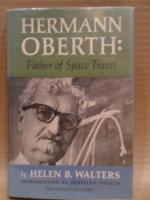|
This section contains 349 words (approx. 2 pages at 300 words per page) |
Austro-Hungarian Physicist 1894-1989
 Hermann Oberth, in his office at the Army's Redstone Arsenal in Alabama, working on a mathematical formula in 1958. Oberth came to the United States in 1956 from Germany as a consultant on space travel.
Hermann Oberth, in his office at the Army's Redstone Arsenal in Alabama, working on a mathematical formula in 1958. Oberth came to the United States in 1956 from Germany as a consultant on space travel.
Hermann Julius Oberth, who was born on June 25, 1894, in the Transylvanian town of Hermannstadt, is considered a founding father of rocketry and astronautics. In the 1920s Oberth, whose childhood fantasies had been inspired by the novels of Jules Verne, wrote an influential publication The Rocket into Planetary Space, which discussed many aspects of rocket travel. Later he expanded that work into a larger volume, The Road to Space Travel, which won wide recognition.
After World War I, Oberth studied physics at the University of Munich, where he realized that the key to space travel was the development of multistage rockets. Despite this important insight, Oberth's doctoral thesis on rocketry was rejected in 1922. However, in 1923, he published The Rocket into Planetary Space, which was followed by a longer version in 1929. In the final chapter Oberth foresaw "rockets … so [powerful] that they could be capable of carrying a man aloft."
In the 1930s, Oberth proposed to the German War Department the development of liquid-fueled, long-range rockets. Oberth worked with the rocket pioneer Wernher von Braun during World War II to develop the V-2 rocket for the German army. During this period Robert Goddard waslaunching liquid-fueled rockets in the United States. After the war Oberth and von Braun collaborated again at the U.S. Army's Ballistic Missile Agency in Huntsville, Alabama. Oberth contributed many important ideas regarding spaceflight, including the advantages of an orbiting telescope. Oberth died in 1989 at the age of 95.
See Also
Goddard, Robert Hutchings (Volume 1);; Verne, Jules (Volume 1);; Von Braun, Wernher (Volume 3).
Bibliography
Friedman, Herbert. The Amazing Universe. Washington, DC: National Geographic Society, 1975.
Heppenheimer, T. A. Countdown: A History of Space Flight. New York: John Wiley &Sons, 1997.
McDonough, Thomas R. Space: The Next Twenty-Five Years. New York: John Wiley& Sons, 1987.
Ordway, Frederick I., and Mitchell R. Sharpe. The Rocket Team. New York: ThomasY. Crowell, 1979.
Internet Resources
Hermann Oberth: Father of Space Travel.
|
This section contains 349 words (approx. 2 pages at 300 words per page) |


